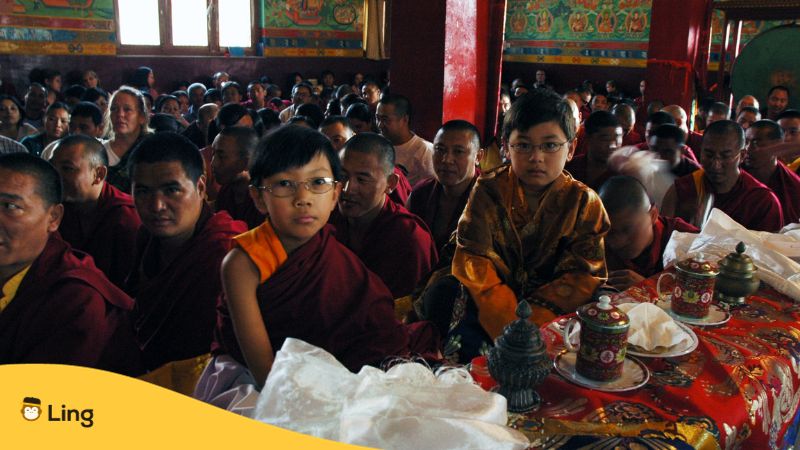In Nepal, the role of teachers is deeply revered and celebrated as an integral part of the culture. On Nepali Teacher’s Day, known as “Shikshak Divas” (शिक्षक दिवस), students across the country pay tribute to their educators.
As a language learning enthusiast, it’s not just about mastering the language, it’s also about understanding the culture. Keeping that in mind, let’s explore some essential Nepali words for Teacher Day and delve into the significance of education in Nepal.
Most Important Nepali Words For Teacher Day
Here are some words related to Teachers Day and the sphere of education.
1. Teacher – Shikshak (शिक्षक)
The most fundamental word to know for Teacher’s Day in Nepal is “Shikshak” (शिक्षक), which means “teacher” in English. Spiritual and academic teachers in Nepal play a pivotal role in shaping the future of their students, and their dedication is highly respected.
2. Mentor – Guru (गुरु)
In addition to “शिक्षक,” the term “Guru” (गुरु) is commonly used in Nepal to refer to teachers. This word carries a deeper sense of mentorship and spiritual guidance, reflecting the profound respect for educators, either in rural and urban teachers.

3. To Study – Padhne (पढ्ने)
Education is highly valued in Nepal, and the word “Padhne” (पढ्ने) means “to study.” Students diligently go to “पढ्ने” in schools to gain knowledge and honor their teachers’ efforts.
4. Education – Shiksha (शिक्षा)
“Shiksha” (शिक्षा) is the Nepali word for “education.” It signifies the importance placed on learning and acquiring knowledge as a means to personal and societal development, especially for World Teachers Day celebration on October 5th.
5. School – Vidyalaya (विद्यालय)
In Nepal, “विद्यालय” (Vidyalaya) is where the journey of education begins. It translates to “school” and is the place where students interact closely with their teachers.
6. Classroom – Pathshala (पाठशाला)
Within the “Vidyalaya” (विद्यालय), the “Pathshala” (पाठशाला) is where the magic happens. It is the “classroom” where teachers impart knowledge to eager learners.
7. Student – Chhatra (छात्र)
“Chhatra” (छात्र) represents the diligent “student” in Nepal who respects and learns from their “शिक्षक” (teacher) or “गुरु” (guru).

8. Book – Pustak (पुस्तक)
Books hold the key to knowledge, and “पुस्तक” (Pustak) means “book” in Nepali. Teachers often guide their “छात्र” (students) through these valuable resources.
9. Education Festival – Shiksha Parv (शिक्षा पर्व)
Nepal celebrates “Shiksha Parv” (शिक्षा पर्व), which is an education festival dedicated to honoring the contributions of teachers and highlighting the importance of education in society.
10. Guru Purnima – गुरु पूर्णिमा
While not exclusive to Nepal, “गुरु पूर्णिमा” (Guru Purnima) is a significant day in the Nepali calendar when students express gratitude and pay homage to their teachers. “Purnima” means the full moon and Guru Purnima is the day in the Hindu calendar on which Gurus are revered.
In Nepal, the reverence for teachers extends beyond the classroom. It’s a culture that places a high value on learning, knowledge, and the individuals who impart it. “शिक्षक दिवस” (Shikshak Divas) is a day of acknowledgment and appreciation for the tireless efforts of educators.
The Culture Of Teachers & Education In Nepal
In Nepal, शिक्षक (Shikshak) holds a revered position in society, embodying the ideals of knowledge, wisdom, and guidance. The respect for teachers, or गुरु (Guru) as they are often affectionately referred to, is deeply ingrained in Nepali culture. They are viewed not only as educators but also as mentors who shape the minds of future generations. This profound reverence is evident in various aspects of daily life, from the formalities used when addressing a teacher to the celebrations on शिक्षक दिवस (Shikshak Divas).
The educational system in Nepal is structured to provide a well-rounded learning experience. विद्यालय (Vidyalaya), or schools, serve as the foundation of formal education. Students, known as छात्र (Chhatra), progress through various levels, with a curriculum that encompasses विज्ञान (Vigyan) (science), गणित (Ganit) (mathematics), इतिहास (Itihas) (history), and more. Within the विद्यालय, the पाठशाला (Pathshala), or classroom, is where the heart of learning beats. Here, teachers impart knowledge, instilling a sense of शिक्षा (Shiksha) that goes beyond textbooks.
As students advance, they transition to higher levels of education, often marked by परीक्षा (Pariksha), or examinations. These evaluations are a crucial part of the educational journey and determine one’s progression. Upon successful completion, students may celebrate स्नातक (Snatak), or graduation, marking a significant milestone in their academic endeavors.
While the formal educational system plays a vital role, informal education is equally valued in Nepal. Families, elders, and community leaders are regarded as important sources of wisdom, with their teachings complementing those received in schools. This holistic approach to education reflects the cultural significance placed on lifelong learning.
Overall, the educational landscape in Nepal is a blend of tradition and modernity, with a deep appreciation for the role of teachers as both instructors and mentors! The respect for educators and the pursuit of knowledge form the bedrock of the Nepali educational experience, shaping generations of learners who carry this reverence and major respect forward.

Wrapping It Up
As you embark on your Nepali language learning journey, remember that understanding the culture and context behind the words enriches your experience. Learning these key words related to Teacher’s Day in Nepali not only enhances your language skills but also deepens your appreciation for the culture and traditions of Nepal. So, try “पढ्ने” (Padhne) and explore the beauty of the Nepali language and its rich heritage. Happy learning!
Learn Nepali With Ling
You can check out useful Nepali verbs & important conversational phrases in Nepali for more language learning fun! Want to learn more Nepali but don’t know where to find resources on this niche language? You can try the Ling app!
It is a highly researched language-learning app for a fun and personalized experience. With Ling, you’ll smash your language goals with a little hard work and practice. Aside from Nepali, there are over 60+ foreign languages to learn on Ling. Download it on the App Store and Play Store today!

































































